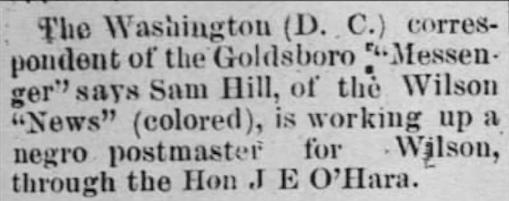On 17 February 1882, the Wilson Advance ran a brief piece announcing that the colored people would begin publishing the Wilson News in March of that year, and S.N. Hill would be an editor of this for-the-people-by-the-people paper. (No editions are known to survive.) Two months later, Samuel Hill was well-enough established in local politics to be appointed a poll holder in Wilson.

Wilson Advance, 14 April 1882.
The Advance was the first foray of notorious, but much celebrated, Josephus Daniels into the newspaper business, and the white supremacist world view he later honed to a fine point at Raleigh’s News & Observer was on naked display in its pages. Local and regional Republican politics, which were dominated by African-Americans, were not spared. That the Advance‘s presses printed Hill’s paper did not shield him either. The Advance printed the satirical letter below (and a similar one a few weeks later) purportedly written by “Jedekiah Judkins” to George W. Stanton, a die-hard Unionist and Republican.

Wilson Advance, 20 October 1882.
Snide commentary in the white press notwithstanding, Hill networked and exchanged ideas with other black journalists and political figures in eastern North Carolina the following summer. [Was the Independent yet another newspaper?]

Wilmington Daily Review, 5 July 1883.
His statewide networking secured his designation as a marshal for the state colored fair.
The Banner-Enterprise (Raleigh), 27 October 1883.
The News apparently was still in publication in December 1883 when the Advance printed a small blurb suggesting that Hill was angling for postmaster appointment under the auspices of James E. O’Hara, who had been elected in 1882 as a Republican to the United States House of Representatives from North Carolina’s “Black Second” district.

Wilson Advance, 21 December 1883.
Months later, however, the paper seems to have faltered, and Hill had to relaunch the publication.

Wilson Advance, 25 April 1884.
On 22 January 1885, the Advance printed a brief note that a Samuel Hill referred to in a recent article as having been chaged with perjury in Toisnot township was not the “Samuel N. Hill that all our people know.” The known Hill had stopped by the Advance‘s offices and informed them that “he is now traveling for a newspaper at New Bern.”
By the late 1880s, Hill was living in Wilmington, where newspaper reports note that he was active in efforts to encourage African-American investment in local railroad companies.
Not quite five years later, the Advance reported that Hill, an “irrepressible” “coon,” had received a patronage position in Washington. There is no evidence that he returned to Wilson.

Wilson Advance, 29 August 1889.
Within the next few years, however, Hill withdrew from active politics and began to espouse an accommodationist philosophy. On 27 November 1898, New Bern Daily Journal published a letter by Hill lashing out at “unscrupulous white Republicans” and “scheming politicians” and praising the good white folks who had always shown “the best sympathy” to colored people. “Make friends with the best white people among whom you live,” he exhorted. “Their interests are greater than yours and the maintenance of happiness depends upon their efforts.” A few weeks later, on 10 December, the Wilmington Morning Star cited Hill’s “sensible and calm utterances” in the wake of the Wilmington Insurrection as a positive contrast to the stridency of Congressman George E. White, a “bumptious strutter.” For his part, Hill had pshawed agitation against “fancied evils which do not exist” and counseled “[t]he best public meeting for the negro to attend is his church, where he may commune with his God, and where he may be influenced for good.”
So where did Sam Hill come from? And where did he go?
Most likely, he was the Samuel Nelson Hill who opened two accounts at the Freedmen’s Bank’s New Bern branch. The first time, on 9 August 1871, Hill was 12 years old. His account registration card notes that he resided in Bragg’s Alley; was light-complected; was the son of Moses M. and Adeline Hill; had brothers named Benjamin Starkey (dead), Moses Hill and Thomas Hancock; and sisters named Carolina and Holland Hill. The boy signed his own name.
Hill opened another account on 8 June 1874. Per that account registration, he was born and “brought up” in New Bern; resided in Windsors Brickyard, Virginia; worked for Dr. Windsor; was 15 years old; was of yellow complexion; and had a brother named Noah Harper, also of New Bern. Samuel signed his name with a mature version of his earlier signature and with a confident, curlicued firmness that connotes deep literacy.
In the 1880 census of New Bern, North Carolina: on Elm Street, shoemaker Moses Hill, 49, wife Adelaine, 43, son Samuel, 20, a shoemaker, and daughter Susan, 1. Moses reported that he suffered from rheumatism and Susan from whooping cough.
Hill probably arrived in Wilson in 1881. His star there burned bright and brief, and by about 1885, he had moved on. His whereabouts the decade of the 1890s are unclear, but just after the turn of the century Hill is found in the Berkshires of western Massachusetts, performing manual labor.
On 19 November 1904, Samuel Nelson Hill, 45, of 288 North Street, Pittsfield, Massachusetts, married Georgeanna Treadwell Vanderburgh, 43, of 6 Cole Avenue, Pittsfield. Hill reported that he was the son of Moses Hill and Adeline Hancock and was born in New Bern, North Carolina. He worked as a laborer, and this was his first marriage.
In the 1910 census of Pittsfield, Berkshire County, Massachusetts: electrical works janitor Samuel N. Hill, 50, and wife Georgeanna, 49.
Samuel Nelson Hill of 164 Linden died 21 March 1918 in Pittsfield, age 58 years, five months, five days.


2 comments